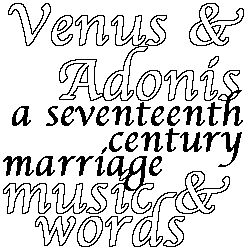|
VENUS AND ADONIS

ROBERT HUGILL muses on the marriage of
music and words in the seventeenth century
The Civil War had a remarkable effect on English theatre. In 1642, Parliament under Cromwell passed an edict closing all public theatres. This drove theatre underground and when it reappeared in public (in 1660 on the restoration of Charles II), theatregoing was radically different.
After the closure in 1642, all available private spaces were pressed into action as theatres and new dramatic forms were invented to circumvent the regulations. One of these was the play with music, in emulation of the Italian opera and inheriting the Court Masque tradition.
One of the most influential plays with music was The Siege of Rhodes, mounted in Rutland House in 1656 before a private, royalist audience. The men behind the event had remarkable links to the pre-war Court Masques. The organiser and librettist was William Davenant, who had followed Ben Jonson as Court playwright. The scenery was designed John Webb (assistant to Inigo Jones, who had himself collaborated with Jonson on many Masques). The Siege of Rhodes is commonly regarded as the first through sung English opera, but it had another notable feature. Webb designed the scenery on the Italian system of painted backgrounds and movable flats, providing a link between the fixed scenery of the Court Masque and the flexible scenery of the Jacobean Theatre.

Venus and Adonis - music and words - a seventeenth century marriage
|
On Charles II's restoration, he made theatres legal again. But he gave royal patents to just two people, William Davenant and Thomas Killegrew, both loyal friends of Charles's. Davenant had, in fact, received a Royal patent in 1639 to build a new playhouse to perform plays and musical entertainments, but the Civil War intervened. During his exile, Charles had experienced new theatrical developments on the continent and he was keen to see them in place in London. So the theatre developed as a fully covered stage and auditorium, lit by windows and candles, still with an apron stage but with a proscenium as well, scenery provided by a flexible system of changeable flats allowing for spectacular scenic effect, and the whole thing acted by a company of men and women. At Charles's insistence, boys were no longer used in the theatre.
Continue >>
Copyright © 2 May 2004
Robert Hugill, London UK

|

